Basij Militia Attacked, Killed In Tabriz
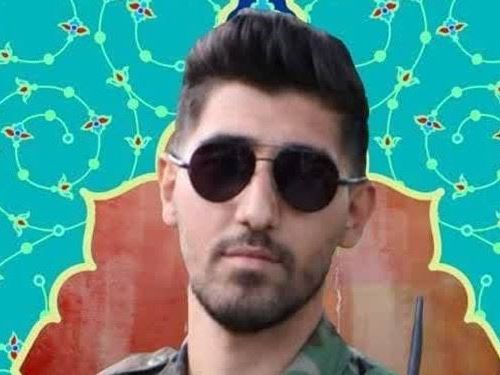
The IRGC says one of its Basij militia members was attacked and killed in the northwestern city of Tabriz.

The IRGC says one of its Basij militia members was attacked and killed in the northwestern city of Tabriz.
In a statement on Sunday, the IRGC, or Revolutionary Guards Corps, identified him as a member of the Razavioun neighborhood patrol, named Amir Hosseinpour, claiming he was attacked by an assailant during a patrol mission and died four days later.
The statement does not mention any further details about the incident, the arrest of the attacker and his possible motives.
The Razavioun neighborhood patrol is a joint initiative involving the Law Enforcement Force and the Basij militia. The regime claims it has been launched to provide security, but many believe that its main goal is to suppress and arrest protesters.
In this initiative, the religious city of Qom served as a testing ground in 2018. At that time Colonel Mohammad-Reza Movahed, deputy commander of the Qom Islamic Revolutionary Guard Corps, claimed the Razavioun patrol fights "theft, narcotics and hooliganism."
However, critics believe that the purpose of creating such parallel activities is the widespread presence of regime forces in the neighborhoods.
Several military and paramilitary forces have been killed in Iranian cities amidst the uprising in recent months.
After the protests following the death in custody of Mahsa Amini and the deadly and violent suppression of protesters, attacks on military and law enforcement forces, as well as clerics have increased significantly.
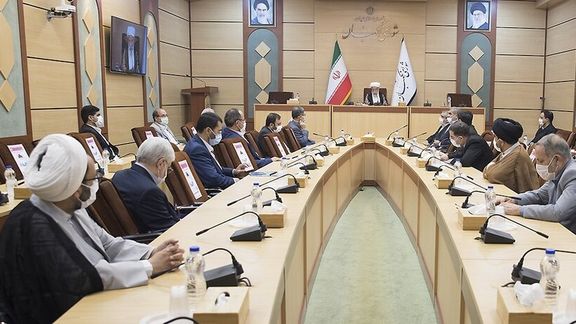
Iranian media and politicians continue the debate about whether Iran's disenfranchised reformist groups will take part in the upcoming parliamentary elections.
At the same time many acknowledge that elections are meaningless in Iran as long as the hardliner Guardian Council determines who should run for office.
The media say less than eight months before the elections, the conservatives have already started campaigning while there is no sign of election-related activities among the reformists.
Several reformist figures have pointed out that considering the precedence set during the latest elections in Iran in 2020 and 2021, no well-known reformist figures will be allowed to run. Some including pundit Saeed Hajjarian have even called for boycotting the elections.
Moderate political analyst Gholamali Rajaee has told conservative website Nameh News that "No decision has been made yet to boycott the elections, but perhaps non-participation will be a choice for voters." He explained that "If reformist voters cannot find the right likeminded candidates, they may decide not to take part in the election all together."
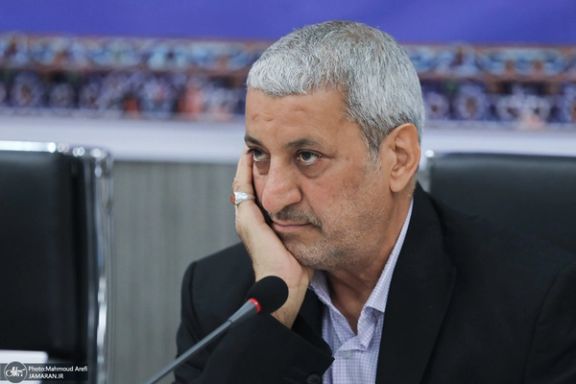
But the issue goes much farther than reformist voters. Both in 2020 and 2021 when mostly hardliners were approved to run, vast segments of the population stayed home, delivering two of the lowest voter turnouts in Islamic Republic’s history.
According to Nameh News, some Iranian conservatives believe that the reformist camp has been radicalized after the election of Azar Mansoori in June as the leader of the Reform Front, an umbrella organization that exercises influence among reformist groups and parties.
Rajaee said that the reformists might come to the conclusion that their candidates will not be allowed by the Guardian Council to run for the election. "When they do not have anyone to elect, naturally, they conclude that their participation will be useless," he said, adding that some of the conservative leaders expect reformists to take part in the election and accept to acknowledge that they have lost the election to conservatives. That is not logical, he said.
"If the reformists do not accept such a deal, then the conservatives brand them as boycotters and the advocates of regime change. They have said that before, and the may say it again," Rajaee argued.
Meanwhile, conservative activist Gholamali Jafarzadeh Imenabadi said that "If the reformists actively take part in the election, the conservatives will have no choice other than forging coalitions to stand against them."
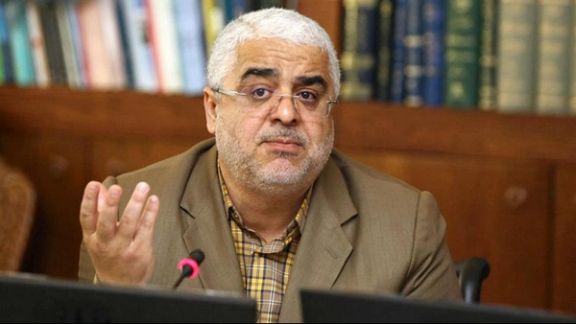
Stressing that the conservatives have already began campaigning, Imanabadi said that some of their leaders have started visits to provinces to organize likeminded political groups ahead of the elections. However, he pointed out that the conservatives might find it hard to create some kind of accord among various groups. Imenabadi added that there are already several conservative and hardliner coalitions with their own separate agendas and some of them do not realize the need to come to some sort of agreement with others.
"They can still further their agenda if reformists and moderate groups do not enter the elections in an organized way. But if they do, then the conservatives will have no choice other than forming strong coalitions.
Along the same lines, in an interview with Nameh News, Hamid Reza Taraqqi, an Islamic Coalition Party member spoke about former Majles Speaker Ali Larijani's probable candidacy and said: "If he is serious about nominating himself he should update his views about revolutionary behavior and values and get ready for a new judgment of his merits by conservative voters and politicians.
Many conservatives have said earlier that Larijani does not have a voters’ base and first of all he needs to decide who he wants to represent, the reformists, the moderates or the conservatives. Larijani was a conservative politician throughout his career, but he got close to moderates during the presidency of Hassan Rouhani (2013 – 2021), and his candidacy was rejected by the Guardian Council for the 2021 presidential election.
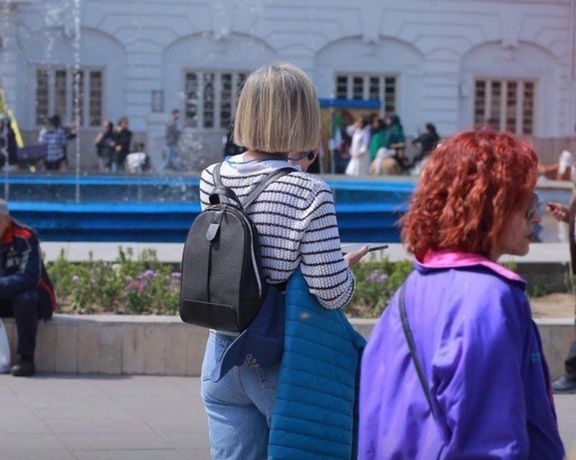
Images and reports on social media indicate that a large crowd in Rasht, northern Iran have been protesting evening after security forces tried to arrest three women over hijab.
A video received by Iran International shows thousands of people gathered gathered outside the city hall in Rasht after the hijab police tried to whisk away three women. Onlookers intervened and rescued the women. As the news of the incident spread in the city, residents began to gather in the square in protest.
Some tweets say that gunshots were heard and security forces also fired tear gas, but it is too early to verify those reports.
Iran on Sunday officially announced the return of the hijab police to streets and earlier videos and reports received from Iran showed numerous incidents of confrontations between women who chose to appear without covering their head and plainclothes hijab enforcers.
Last September, the death of 22-year-old Mahsa Amini in hijab police custody triggered months of protests and the government for a while ordered enforcers off the streets. But in the past six months more and more women have shed the hijab and appear in public in ordinary attire.
Clerics and hardliners however have been pushing for a forceful reaction to what they call "loss of honor", "lawlessness" and a phenomenon threatening the very foundations of the clerical regime.
A video emerged on Saturday showing a hijab enforcer attacking and trying to detain a teenage girl. The video quickly became viral on Persian Twitter.
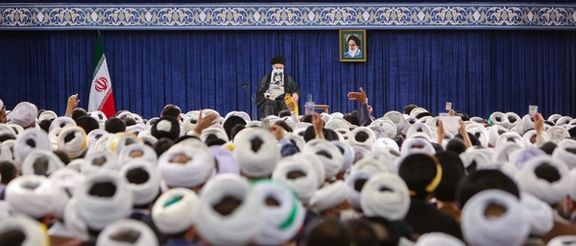
They preach on Fridays telling Iranians to tolerate economic hardship but Khamenei's ayatollahs enjoy immunity for corruption as his regional representatives.
Revelations about numerous cases of economic corruption and land and forest grabs by Ali Khamenei’s representatives across the country have outraged Iranians with fury so deep that even a few brave politicians have dared to speak out.
The Friday Prayer Imams, the regional representatives pushing the regime rhetoric, have managed to evade prosecution and remain immune to legal consequences.
The latest case involved Ayatollah Ahmad Alamolhoda -- the Friday Imam of Mashhad and the father-in-law of President Ebrahim Raisi– who has been pocketing large sums of money from the Goharshad endowment without any real responsibility or duties.
Last week, Vahid Ashtari, a hardline whistle-blower known for revealing corruption among Iran’s senior officials, published a thread of tweets with details about one of the biggest financial endowments of the country, Goharshad, ironically meaning Happy Jewel in English. The endowment is second only to the "Astan Quds Razavi," another charity controlled by clerics close to Alamolhoda. As part of the decree that gives the charitable foundation to Alamolhoda, he can have 10 percent of its total income as his personal salary, while another 10 percent provides the salaries of all the other staff who work there. Alamolhoda has confirmed the reports but claims that whatever he is doing is legal.
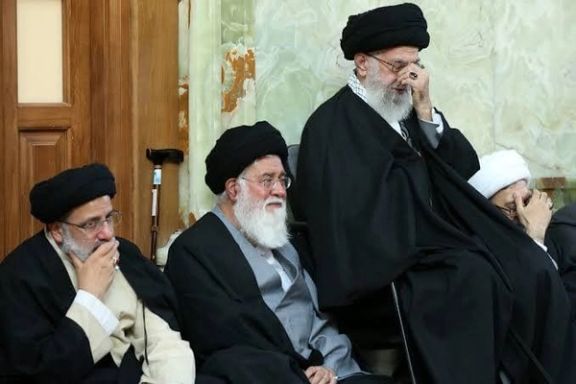
This means that the firebrand cleric, who had been serving as the trustee of the Goharshad Mosque endowment about seven years ago, receives a substantial monthly cut of approximately 100 billion rials (about $200,000), according to Iran International’s investigative journalist Mojtaba Pourmohsen. The average monthly salary of an Iranian is about $150 to $200.
Another high-profile case is Ayatollah Kazem Nourmofidi, the representative of the Supreme Leader in the northern Golestan province, whose rule over the province’s forest exploitation has always been known among locals. He owns the largest wood businesses in the region and his offspring are involved in at least 20 wood companies.
Nourmofidi, who is the brother in law of another great ayatollah Mohammad Fazel Langrani, is pocketing hundreds of thousands of dollars per month for wood smuggling from the lush forests of northern Iran.
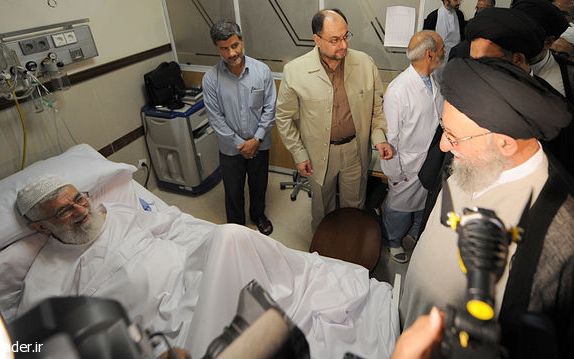
Another Friday imam who is taking advantage of his relationship with Khamenei is Zeinolabedin Ghorbani, the former representative of Khamenei in Gilan province. He started a shopping mall project in the city and pre-sold the units upon the inauguration but never delivered them and people who paid found no remedy in courts.
Ashtari is a member of Edalat Khahan (Justice Seekers), a political group of mainly of young conservatives and university students who are loyal to Khamenei and are also close to former nuclear negotiator Saeed Jalili who ran against Raisi. In April last year, his revelations sparked the Layette-gate scandal that led to calls for the resignation of Speaker Mohammad-Bagher Ghalibaf and resurfacing of other alleged corruption cases against his family.
In June, Ashtari's investigations revealed in a series of tweets that a 150-hectare piece of land endowed by a local family in Qazvin including a farm with 1,000 cattle was rented out at a monthly rent of 10m rials (around $20 at current exchange rates) to Mona Chaychian, the daughter-in-law of the head of the State Endowment Organization Mehdi Khamoushi, another Khamenei appointee.
In a public meeting with a group of his representatives last year, Khamenei referred to economic corruption by top clerics as "economic activity" and advised his Friday imams to refrain from engaging in such matters due to their lack of expertise in the field.
Masih Mohajeri, another hardliner activist and politician, said in a strongly-worded article that, "People refuse to accept that in a country with such wealth and resources, a few individuals amass fortunes while millions of families are in poverty. This is not the right of the people who live in a wealthy country."
"Those who claim to have established justice in the Islamic Republic system should address these inequalities by sidelining those close to power who seize public assets and consider themselves righteous and superior to others,” he added. "Do not assume that the patience of the people is endless. Beware of the day when the army of the hungry rise against you."
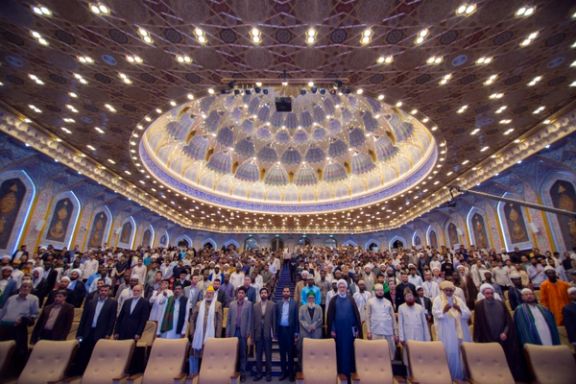
The dean of Iran’s Al-Mustafa International University says some of the officials of the new government of Afghanistan have studied at the institution.
The university, which is the Islamic Propaganda Bureau of the Qom Seminary, is a state-funded university-style Shia seminary with branches in almost 60 countries.
In an interview, Ali Abbasi said people of 83 nationalities are studying at the institution while in its Kabul branch, more than 50 percent of scholars are Tajiks and Sunnis.
It is not clear exactly what is being taught at the Kabul branch after the Taliban takeover, but the branch’s website reported almost 4,500 scholars were studying there until 2019.
Abbasi did not explain how people who were trained in this Shiite complex took positions at the Sunni government of the extremist Taliban.
The Al-Mustafa University pays for hundreds of foreign students from China to Africa and Latin America who come to study and then return to spread Iranian Shiite teachings in their countries.
Observers say Al-Mustafa has become Iran's chief tool for promoting Shi'ism abroad. The university received around $80 million in the 2020-2021 Iranian budget, making it more important than ever. It is believed that Ayatollah Ali Khamenei's office and businesses under his control provide additional funding to Al-Mustafa.
In 2020, the United States imposed sanctions on the massive university network, alleging that it recruited Afghan and Pakistani students to fight in Syria.
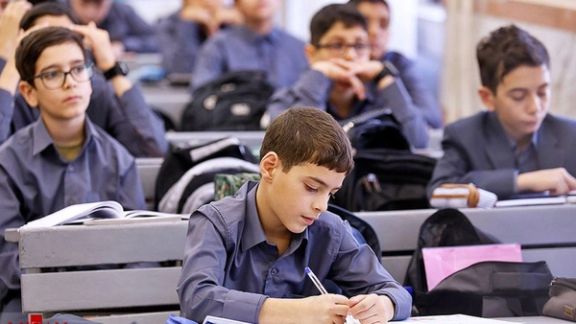
An official from the Iranian ministry of education says students are no longer required to learn English, but Arabic is still mandatory.
Fatemeh Ramezani, the Secretary of the Curriculum and Training Commission of the Supreme Council of Education, said Sunday that "students must learn a foreign language during their junior and senior secondary education, but this language is not necessarily English."
She said that instead of English, students can choose French, German, Italian, Russian, Chinese, and Spanish, as well as additional courses in Arabic.
Ramezani emphasized that Arabic "as the language of the Qur'an" is mandatory in the first and second year of secondary education.
In January, the Islamic Republic announced its intention to change the content of textbooks in foreign language schools after criticism by Iran’s ruler Ali Khamenei.
The head of the body for non-governmental schools, Ahmad Mahmoudzadeh, told ILNA: “We will have a call to produce content of language books for schools, which will be implemented in line with the order of the Supreme Leader,” suggesting locally produced, more religious material would replace any taught content.
Ali Khamenei has criticized teaching English in general, deemed the language of the West which he commonly refers to as 'the enemy'. In 2016 he criticized its being taught as early as kindergarten, leading the ministry of education to subsequently ban teaching English in primary schools.
In recent years, some government officials have also suggested that instead of English, the teaching of Russian, Chinese and German languages should be supported in Iran.